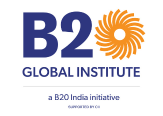Issue Brief
Thematic Area: Capability Building, Skilling and Mobility

Takeaways from G20 South Africa Note on Research and Innovation
Introduction
Research and innovation play an important role in developing new technologies that enhance quality of life and economic activity, which, in turn, improves a nation’s competitiveness in the global economic marketplace and its trade activity. Therefore, recognizing the importance that positive research and innovation environments play in enhancing economic performance, the G20 South Africa Task Force on Research and Innovation intends to build upon the Terms of Reference (ToR) developed during the inaugural meeting of the Research and Innovation Working Group (RIWG) to leverage research and innovation to address global challenges, promote international cooperation, and reduce inequities in access to the production of science, research and innovation. In this regard, the G20 South Africa Task Force on Research and Innovation is building on the previous themes of Research and Innovation for Equitable Society and Open Innovation for a Just and Sustainable Development under the Indian and Brazilian G20 Presidencies respectively through the theme of Equity in Science and Innovation-based Approach to Sustainable Development.
Priority Areas of G20 South Africa Task Force on Research and Innovation
Priority Area #1: Open Innovation for Development
The G20 South Africa Task Force on Research and Innovation intends to build upon the Open Innovation Strategy that was developed under Brazil’s G20 Presidency to promote inclusive collaborations in research and innovation to achieve Sustainable Development Goals (SDG) and address cross-border challenges that inhibit greater cooperation on research and innovation. Moreover, the Task Force intends to push for inclusivity for the Global South and international North-South collaboration in Science, Technology, and Innovation through implementing the Open Innovation Strategy during South Africa’ G20 Presidency.
Specifically, the Task Force intends to develop the G20 Open Innovation Platform of Platforms to integrate innovation ecosystems across the G20 membership. Moreover, the G20 Task Force intends to incorporate inputs from the youth and innovation communities to refine, define, and streamline the development of the G20 Open Innovation Platform of Platforms. The G20 South Africa Task Force also plans to host an event for Youth Digital Techpreneurs in cooperation with the South African Department of Small Business Development (DSBD) and Department of Communications and Digital Technologies.
In addition, the G20 South Africa aims to develop an Open Innovation Demonstrator Project on Disaster Risk Reduction with the United Nations Scientific, Educational and Cultural Organisation (UNESCO) and the United Nations Conference on Trade and Development (UNCTAD) as knowledge partners to highlight how open innovation could respond and address Science, Technology, and Innovation problems.
Priority Area #2: Biodiversity Information for Sustainable Development
The G20 South Africa Task Force on Research and Innovation identified biodiversity as a crucial component of key conservation and economic sectors such as forestry, agriculture, fisheries, tourism, health, and energy as well as sustainable development. The G20 Task Force on Research and Innovation intends to protect global biodiversity to address 17 SDGs and subsequently provide solutions for challenges pertinent to the African continent including sustainable development and poverty alleviation.
In this regard, the G20 South Africa Task Force on Research and Innovation would highlight the importance of species cataloguing or data monitoring to support the ability to monitor, report, and conserve biodiversity to promote a sustainable planet. The Task Force would align itself with previous iterations of the RIWG on joint open science themes as well as previous G20 commitments for expanding the information base of the Global Biodiversity Information Facility (GBIF). To achieve this goal, the Task Force intends to support further initiatives in data mobilization (species cataloguing), human capacity development for policy-relevant biodiversity data through the Biodiversity Information for Development (BID) program, utilizing data gathered to impact the science, policy, and bioeconomy domains through establishing dedicated centers of excellence to grow biodiversity informatics as a field of global study.
Therefore, to this end, the G20 South Africa Task Force on Research and Innovation intends to support the production of GBIF network expansion through the 18 Convention on Biodiversity Regional Support Offices, conduct a seminar highlighting museum collaboration to equitably reduce the capacity and knowledge asymmetry, and gather G20 support for GBIF to build a Catalogue of Life (a list of all the world’s species).
Priority #3: Diversity, Equity, Inclusion and Accessibility in Science, Technology and Innovation
In line with the G20 South Africa Task Force on Research and Innovation’s theme for the latest iteration of the RWIG, Diversity, Equity, Inclusion, and Accessibility in Science, Technology, and Innovation, the Task Force aims to promote inclusive development where indigenous, marginalized, and under-represented groups are included in STI (Science, Technology, and Innovation) architecture and developing countries are included in the global STI enterprise. The Task Force intends to develop an Indigenous Knowledge System platform, conduct dialogues to promote gender inclusion and gender mainstreaming, and engage G20 members and marginalized communities to promote inclusivity in STI initiatives. The Task Force has identified UNESCO as the key international partner to collect disaggregated data on STI for the Task Force to inform initiatives.
The G20 Task Force aims to advance inclusivity initiatives in the STI space through four key deliverables. First, the Task Force aims to develop an Analytical Framework for Diversity, Equity, and Inclusion in STI Policies and Policy Instruments. Next, the Task Force would develop an analysis of Innovation for Inclusive Development Policies, Models and Approaches adopted by the G20 and propose recommendations on how to address gaps. Third, the Task Force would issue an aggregated declaration consisting of recommendations on science popularization through dissemination and citizen science initiatives. Finally, the Task Force would conduct a bilateral side event between the G20 and UNESCO to promote the inclusivity of girls and women in STI.
Conclusion
The G20 South Africa Task Force on Research and Innovation through its theme of , Diversity, Equity, Inclusion, and Accessibility in Science, Technology, and Innovation would leverage the RWIG to promote greater openness and global cooperation in research, an increased focus and refined understanding of biodiversity informatics, and greater inclusivity of marginalized or underrepresented communities.
Read more on the G20 Task Force on Research and Innovation here…
